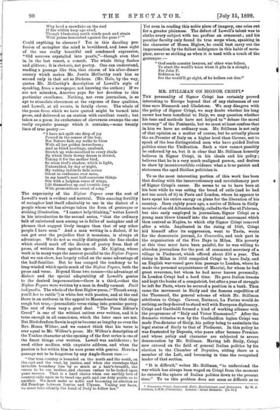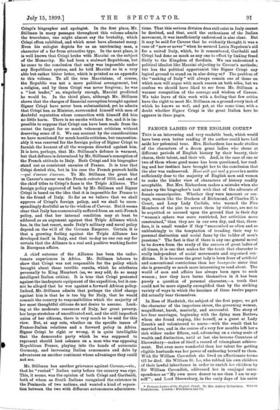MR. STILLMAN ON SIGNOR CRISPI.*
THE personality of Signor Crispi has certainly proved interesting to Europe beyond that of any statesman of our time save Bismarck and Gladstone. We may disagree with the policy of Signor Crispi, we may doubt whether his long career has been beneficial to Italy, we may question whether his tone and methods have not helped to "debase the moral currency" of the Peninsula, but we must at least confess that in him we have no ordinary man. Mr. Stillman is not only of that opinion as a matter of course, but he actually places the ex-Premier of Italy on a higher level than Cavour, not to speak of the less distinguished men who have guided Italian politics since the Unification. Such a view cannot possibly be endorsed by us, but it is clear that Mr. Stillman honestly believes in Signor Crispi, in his ideals and his policy ; believes that he is a very much maligned person, and desires to show by incontrovertible evidence what a true patriot and statesman the aged Sicilian politician is.
To us the most interesting portion of this work has been that dealing with the insurrectionary and revolutionary part of Signor Crispi's career. He seems to us to have been at his best while he was eating the bread of exile (and he had not too much of it) in Paris and London, where he appears to have spent his entire energy on plans for the liberation of his country. Born eighty years ago, a native of Ribera in Sicily member of an old Albanian family, called to the Bar at Palermo, but also early employed in journalism, Signor Crispi as a young man threw himself into the national movement which then centred at Naples, to which city Signor Crispi removed after a while. Implicated in the rising of 1848, Crispi hid himself after its suppression, went to Turin, wrote for the democratic journal, La Concordia, and took part in the organisation of the Five Days in Milan. His poverty at this time must have been painful, for he was willing to abandon journalism for the post of communal secretary of a village in Piedmont, which offered about E50 a year. The rising in Milan in 1853 compelled Crispi to leave Italy, and an English war-vessel gave him passage to London, where he made the personal acquaintance of Mazzini, for whom he had great reverence, but whom he had never known personally. In London Crispi had a hard time. He gave Italian lessons and kept the books of a compatriot, but after a year of struggle he left for Paris, where he secured a position in a bank. Then came the movement in Sicily and the famous expedition of the Thousand, the general scheme of which Mr. Stillman attributes to Crispi. Cavour, Rattazzi, La Farina would do nothing, as they desired to stand well with European diplomacy. Crispi and Garibaldi formed a kind of working alliance with the programme of "Italy and Victor Emmanuel." After the dramatic victories won by the Garibaldian legion Crispi was made Pro-dictator of Sicily, his policy being to assimilate the legal status of Sicily to that of Piedmont. In this policy he was frustrated by Depretis, who years after became Premier, and whose policy and character are subjected to severe denunciation by Mr. Stillman. Having left Sicily, Crispi now entered on the field of general Italian politics by his election to the Chamber of Deputies, sitting there as a member of the Left, and becoming in time the recognised leader of that section.
"it is difficult," writes Mr. Stillman, "to understand the war which has always been waged on Crispi from the moment he entered the sphere of Italian politics down to the present time." To us this problem does not seem so difficult as to
* Francesco Crispi, Insurgent, Exile, Revolutionist, and Statesman. By W. J. Stillman, L.H.D. (Concordia). London : Grant Richards. [7s. 6d.] Crispi's biographer and apologist. In the first place, Mr. Stillman in many passages throughout this volume admits the truculence, one might almost say the brutality, which Crispi often exhibited, and which must have alienated many. Even his eulogist depicts for us an unrelenting man, a character of a far from attractive type. In the next place, it is well known that Crispi broke with Mazzini on the subject of the Monarchy. He had been a stalwart Republican, but he came to the conclusion that unity was impossible under any Republican system, and he told Mazzini so in a very able but rather bitter letter, which is printed as an appendix to this volume. To all the true Mazzinians, of course, the Republic was not a mere political arrangement, but a religion, and by them Crispi was never forgiven ; he was a "lost leader," as, singularly enough, Mazzini predicted he would be. In the third place, although Mr. Stillman shows that the charges of financial corruption brought against Signor Crispi have never been substantiated, yet he admits that Crispi has, as Minister, surrounded himself with men of doubtful reputation whose connection with himself did him no little harm. There is no smoke without fire, and it is im- possible to suppose that Crispi can have been made from the outset the target for so much vehement criticism without deserving some of it. We can account by the considerations we have mentioned for much hostile criticism, but unquestion- ably it was reserved for the foreign policy of Signor Crispi to furnish the keenest of all the weapons directed against him. It is here, perhaps, that Mr. Stillman's defence is warmest, but that defence is determined by Mr. Stillman's conception of the French attitude to Italy. Both Crispi and his biographer stand out as consistent enemies of France. It is true that Crispi denied this, but in his case the French proverb holds —qui s'excuse s'aecuse. To Mr. Stillman the great blot Cavour's career was the French entente of 1859, and one of the chief titles to Crispi's fame is the Triple Alliance. The foreign policy approved of both by Mr. Stillman and Signor Crispi is based on the idea that it is impossible for France to be the friend of Italy. So far as we believe that we shall approve of Crispi's foreign policy, and we shall be corre- spondingly doubtful as to the wisdom of Cavour. But it seems clear that Italy has economically suffered from an anti-French policy, and that her internal condition may at least be adduced as an argument against that Triple Alliance which has, in the last resort, made Italy's military and naval policy depend on the 'will of the German Emperor. Certain it is that a growing feeling against the Triple Alliance has developed itself in Italy, and that to-day no one can say for certain that the Alliance is a real and positive working factor in European affairs.
A chief outcome of the Alliance has been the unfor- tunate experiences in Africa. Mr. Stillman labours to show that Crispi was not responsible for the policy which brought about those terrible results, which he attributes personally to King Humbert (as, we may add, do so many intelligent Italian critics). It is true that Crispi protested against the inadequate equipment of the expedition, but it can- not be alleged that he was against a forward African policy. Indeed, Mr. Stillman admits that perhaps the chief charge against him is that he is too big for Italy, that he would commit the country to responsibilities which the majority of her most thoughtful citizens do not desire to assume. Look- ing at the moderate resources of Italy, her great poverty, her large stretches of uncultivated soil, and the still imperfect union of her citizens, there is very much to be said for this view. But, at any rate, whether on the specific issues of Franco-Italian relations and a forward policy in Africa Signor Crispi be right or wrong, it is quite intelligible that the democratic party which be was supposed to represent should look askance on a man who was opposing Republican France, playing into the hands of autocratic Germany, and increasing Italian armaments and debt by adventures on another continent whose advantages they could not see.
Mr. Stillman has another grievance against Cavour,—viz., that he "rushed" Italian unity before the country was ripe. This, it seems, was the opinion of both Crispi and Garibaldi, both of whom as South Italians recognised the existence in the Peninsula of two nations, and wanted a kind of separa- tion between the two with different autonomous administra-
tions. That this serious division does still exist in Italy cannot be doubted, and that, amid the enthusiasm of the Italian movement, it was insufficiently understood is also clear. But it may be said for Cavour that he evidently thought it was a case of "now or never" when he secured Louis Napoleon's aid for a united Italy, which, be it remembered, Garibaldi and Crispi had done as much as any one to effect by linking freed Sicily to the Kingdom of Sardinia. We can understand a political idealist like Mazzini objecting to Cavour's methods; but has the political opportunist like Signor Crispi any logical ground to stand on in also doing so ? The problem of the "making of Italy" will always remain one of those on which men will argue with much reason on both sides, but we confess we should have liked to see from Mr. Stillman a warmer recognition of the courage and wisdom of Cavour. We take leave of this work with a feeling that few critics have the right to meet Mr. Stillman on a ground every inch of which he knows so well, and yet, at the same time, with a doubt whether Signor Crispi is the great Italian hero he appears in these pages.







































 Previous page
Previous page